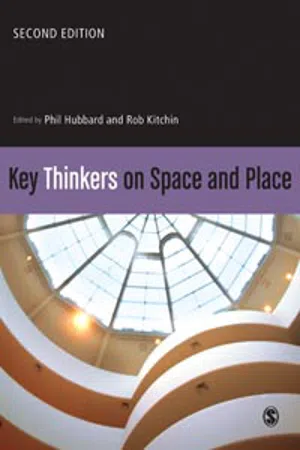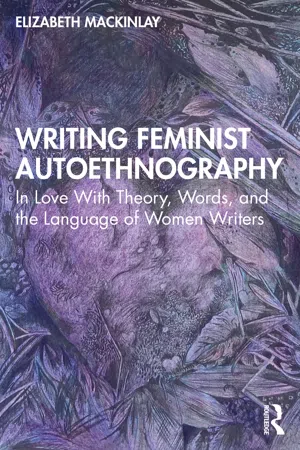Literature
Bell Hooks
Bell Hooks is a prominent feminist author, cultural critic, and social activist known for her insightful and influential writings on race, gender, and class. Her work often challenges traditional power structures and advocates for intersectional feminism. Hooks' accessible writing style and emphasis on personal experience have made her a widely respected figure in feminist literature.
Written by Perlego with AI-assistance
Related key terms
4 Key excerpts on "Bell Hooks"
- eBook - ePub
- Phil Hubbard, Rob Kitchin(Authors)
- 2010(Publication Date)
- SAGE Publications Ltd(Publisher)
32 Bell HooksBIOGRAPHICAL DETAILS AND THEORETICAL CONTEXT
Having published over 20 books of theory, poetry, fiction and autobiography, Bell Hooks is one of the most prominent and influential feminist philosophers of recent years. Her devotion to black activism, intellectual life, and cultural politics in the US has shaped her commitment to dismantling what she terms ‘white supremacist capitalist patriarchy’ via an emphasis on the liberatory politics inherent in blackness, community, and healing. It is from the margins – specifically the experiences of subaltern and disenfranchised communities – that she offers progressive ways of working through the difficulties of race, class, gender, and sexual domination(s).Bell Hooks/Gloria Watkins was born in Hopkinsville, Kentucky, in 1952. She has argued that her familial and household politics forced her, as a young child, to theorise the problems of black patriarchy, sexism, and gender subordination (hooks, 1994b: 59–76). hooks received her BA from Stanford University, and her MA from the University of Wisconsin. She received her PhD from the University of California at Santa Cruz, writing her dissertation on the US novelist and academic Toni Morrison. hooks subsequently taught at Yale, Oberlin, the City College of New York, and Berea College, Kentucky.Her experiences as an undergraduate and graduate student advanced her earlier feminist thinking and her contributions to black feminist thought. First, hooks recognised the lack of historical and contemporary writings by and about black women; secondly, she noticed that second-wave feminism – although not formally named as ‘white’ or ‘white supremacist’ – unjustly marginalised, and in some cases explicitly dismissed, non-white women. This discursive and experiential racism and sexism led her to produce two texts that ‘spoke back’ to these interconnected forms of black marginalisation. Prior to receiving her PhD, hooks (1981) completed Ain’t I A Woman? Black Women and Feminism , a text she had been preparing for several years. Contributing to the long tradition of North American black feminist history and black feminist thought – such as the work produced by Michele Wallace, Audre Lorde, Angela Davis and Zora Neale Hurston, among others – Ain’t I A Woman? maps out US black women’s contemporary and historical experiences. In addition to this, as the title suggests, Ain’t I A Woman? - eBook - ePub
Breaking Bread
Insurgent Black Intellectual Life
- bell hooks, Cornel West(Authors)
- 2016(Publication Date)
- Routledge(Publisher)
hooks is, for example, keenly aware of the degree to which much work in Afro-American studies—especially literary studies— is influence by French theory and German philosophy. She also points out that much of this work was pioneered by talented Black male scholars grappling with the devaluing rules of American intellectual life. Her strategy is neither to prematurely reject these theories and philosophies nor to eschew the efforts of the Black critics—even when this work results in more visibility and prestige than that of her own within the academy. Instead she critically uses these theories and philosophies when and where they illumine, not only in literary studies, but, more pointedly, in film, video, and television studies—areas about which most Afro-American scholars have been silent. She then returns to the work of Black critics to reveal the severe limits of these theories and philosophies when applied to the complexity of Black cultural life. In short, her form of critique neither solely negates nor sophomorically castigates; rather, she creatively appropriates for her purposes. This process not only highlights relentless criticism; it also reinforces enabling forms of critical exchange that expand and empower interlocutors in the dialogue (and readers of her texts).This is why her books help us not only to decolonize our minds, souls, and bodies; on a deeper level, they touch our lives. It is difficult to read a Bell Hooks essay or text without enacting some form of self-examination or self-inventory. To look exclusively for argument and evidence in her work is to remain within one dimension of it. As with a Chekhov play or Billie Holiday solo, one must also probe into the complex interplay of circumstance, pain, and resistance. For Bell Hooks, the unexamined life is not worth living, yet the examined life is hill of yearnings, hurts, and hope.Bell Hooks is an African American writer without being an Afro-centric thinker; that is, she grounds her interests, concerns and subject matter in Black life yet she refuses to view this life in a competitive relation to European or Euro-American life. Like a jazz musician, she is not afraid of or apologetic for the hybrid character of Black culture. Hence she feels no need to spend her energy fighting off White influences, extricating White elements, or teasing out only African sources for her thought. She is also a Black femi-nist—or womanist—writer without being a separatist activist; namely, she puts the flowering of Black women's possibility and potentiality at the center of her work yet she refuses to view this flowering apart from the freedom of Black men. Her unflinching stance against patriarchal, class, imperial, and homophobic practices is rooted in a conviction that embraces the Black and progressive communities. - eBook - ePub
Media Theory for A Level
The Essential Revision Guide
- Mark Dixon(Author)
- 2019(Publication Date)
- Routledge(Publisher)
Formation repeats much of the Jezebel formula, in which corseted troupes of women parade their bodies in sexually explicit dance sequences, inviting audiences to view black women as sexually available and highly promiscuous.Further set text help is available for a range of products for all exam boards at www.essentialmediatheory.comConcept 2: hooks’ call to action
Intersectionality as a political and cultural tool
‘To me,’ hooks writes,feminism is not simply a struggle to end male chauvinism … it is a commitment to eradicating the ideology of domination that permeates Western culture on various levels – sex, race, and class, to name a few – and a commitment to reorganising U.S. society so that the self-development of people can take precedence over imperialism, economic expansion and material desires.(hooks, 1982, 194)hooks’ concerns are historically and analytically informed, but to pigeonhole her as an ivory tower academic solely concerned with the history of black female representation misses much of the political thrust of her writing. Indeed, hooks’ analysis views all forms of oppression – sexism, racism and class-based subjugation – as symptomatic of the middle-class, white male dominated world we live in. The subjugation of these oppressed groups, she tells us, is interconnected. Indeed, the intersectionalist thinkers who have followed hooks’ lead have similarly argued that homophobia, transphobia and disability-based oppressions are also brought about as a result white male oppression.It is also important to understand that hooks’ intersectionalist thinking is not just a tool for analysing or describing the world in which we live. Yes, intersectionality points accusingly to problematic media representations, but it is also a political tool – a cultural instrument that seeks to nurture products that actively challenge the many forms of oppression that white male patriarchy produces. In this sense, we can describe some products as ‘intersectional media’ in that they are knowingly designed to draw attention to the effects of white male power. Intersectional media is constructed to: - eBook - ePub
Writing Feminist Autoethnography
In Love With Theory, Words, and the Language of Women Writers
- Elizabeth Mackinlay(Author)
- 2022(Publication Date)
- Routledge(Publisher)
hooks also pays attention to the craft of writing, the ways in which women might write and the work of writing against the grain in her books Remembered rapture: The writer at work (1999a) and Wounds of passion: A writing life (1999b). Reading these two texts gives rare insight into Bell Hooks the writer, a woman who is passionate about the entanglement of words that seek to write and right the world, and deliberately chooses to do so in an academically rebellious, personal-is-political-is-poetical and sense-as-response-able style. Her work leads me now to share the lessons I have learnt—and am still learning—about writing as a-way to love with and from Bell Hooks as an explicitly feminist autoethnographic practice; lessons I have learnt about returning to love through embodied writing in private and public spaces, about falling in love with theory, about writing self and social experience in educational and ethnographic places as a-way to enter into a praxis of love and about writing words with love so that they might move readers to think and wonder deeply about moving with a love ethic in the world. She holds the gold-coloured book with red text on its yellow spine close to her chest. “What is that book you are reading?” he asks her as she walks in the door. “Bell Hooks”. He raises an eyebrow. “I love her”, she replies. “And this kind of love lasts. Bell Hooks is the woman who taught your cold white-settler-colonial wife how to reunite her heart and body in her academic work and brought her back to the warmth of life”. “Did she? Oh, that’s good, I must write her and say thanks”, he smiles and turns his back. 4 She watches him walk away and clutches the book a little tighter. He is gone and there is an empty space where he once was. But she is not afraid and neither is she alone. bell’s words have touched her deeply and set her on a path that she cannot abort or change
Learn about this page
Index pages curate the most relevant extracts from our library of academic textbooks. They’ve been created using an in-house natural language model (NLM), each adding context and meaning to key research topics.



